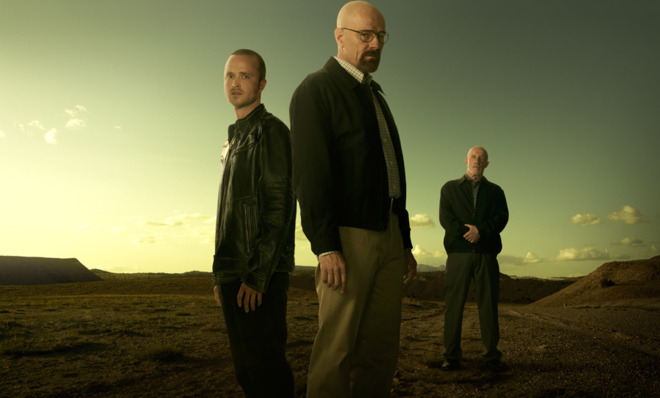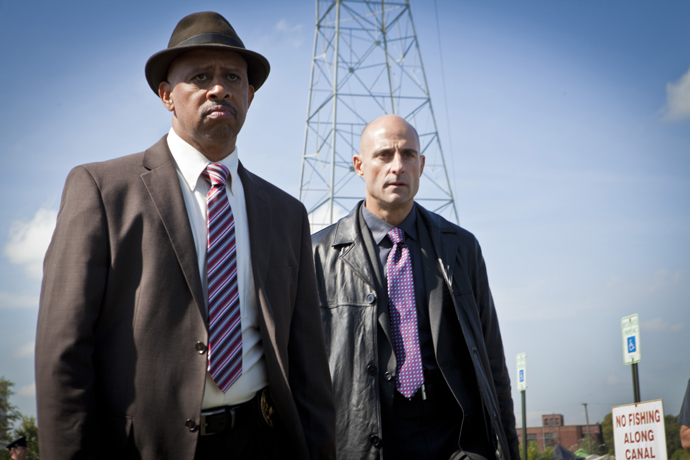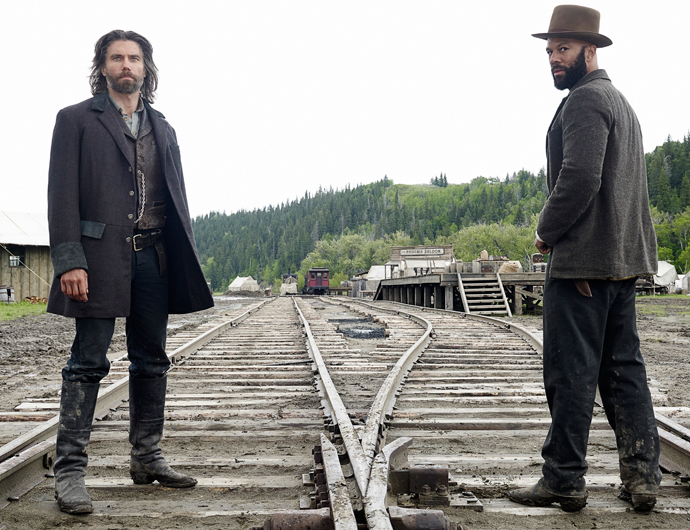Life after Breaking Bad: How AMC can become the best channel on television again
With spin-offs and self-congratulatory talk shows, AMC is moving in exactly the wrong direction. It's not too late to turn things around.


A free daily email with the biggest news stories of the day – and the best features from TheWeek.com
You are now subscribed
Your newsletter sign-up was successful
It's been nearly two weeks since Breaking Bad concluded its final season. But the fact that critics and fans alike are still chattering about it — and, more to the point, not chattering about the Low Winter Sun season finale — is a sign that AMC has some hard days ahead.
The end of a channel-defining show is a bitter pill for any network to swallow, but the end of Breaking Bad finds AMC at a crossroads: With one of its first forays into prestige television behind it (and with Mad Men soon to follow), what kind of TV shows will define AMC in the years to come?
Unfortunately, it seems like the short-term answer for AMC is to take the mercenary route. Over the past month, AMC has set a new standard for shamelessly milking successful TV shows for every last viewer and dollar. Talking Dead and Talking Bad, which air immediately after The Walking Dead and Breaking Bad, are breathless, fluffy recap shows that aim to whip the shows' fans into an even bigger frenzy without providing any actual insight. The Pitch is an awful reality series that attempts to attract Mad Men fans with unfulfilled promises about insights into modern advertising. Recently announced spin-offs of Breaking Bad and The Walking Dead are overt attempts to double down on two of the network's buzziest shows. Worst of all is the decision to split Mad Men's final season over two years, with seven episodes airing in 2014 and seven episode airing in 2015. It's shameless on multiple levels; in addition to cynically extending the reach of AMC's last true prestige drama for another year, it ensures that Mad Men's final season won't have to compete with Breaking Bad's final season at the Emmy awards.
The Week
Escape your echo chamber. Get the facts behind the news, plus analysis from multiple perspectives.

Sign up for The Week's Free Newsletters
From our morning news briefing to a weekly Good News Newsletter, get the best of The Week delivered directly to your inbox.
From our morning news briefing to a weekly Good News Newsletter, get the best of The Week delivered directly to your inbox.

Even AMC's recent, bigger gambles on new original dramas — the place the channel should be spending time and resources — feel like they've been carefully assembled by a team of bean-counters. Low Winter Sun, which concluded its first season with a whimper last Sunday, always felt like a series that AMC had cobbled together from the other, better shows it was desperately trying to emulate. "Look, Breaking Bad fans — we have our own morally ambiguous bald guy! Check it out — it's Gale Boetticher from Breaking Bad! Morgan from The Walking Dead! Ziggy Sobotka from The Wire! You totally love those guys, right?"
But it's not too late for AMC to turn the ship around. With Breaking Bad and The Killing wiped off the map (and Low Winter Sun likely to follow), AMC has a new opportunity to redefine exactly what its identity as a network is going to be. AMC can learn a lot from HBO, which faced a similar crisis in the mid-2000s when a series of early, channel-defining shows like Sex and the City, Six Feet Under, and The Sopranos ended in relatively quick succession. HBO survived despite a series of failed experiments (Lucky Louie, Tell Me You Love Me, and John From Cincinnati) and all-but-forgotten curiosities (In Treatment, Hung, and How to Make It in America). In the end, HBO's answer turned out to be a blend of old and new: A few classically prestigious shows that would have fit into the old order (like Boardwalk Empire and The Newsroom) alongside quirkier genre fare (like True Blood, Game of Thrones, and Veep).
In many ways, AMC spent its early life as a top-tier cable network following the HBO template: Mad Men — which was originally pitched to HBO — comes from Matt Weiner, who cut his teeth on The Sopranos. Hell on Wheels is a western riff in the vein of Deadwood. The Walking Dead has the pulpy genre appeal (and unfortunately, the unevenness) of True Blood. There are other roads AMC could have gone down. One such option was 2010's criminally underseen Rubicon — a series shepherded by the brilliant Henry Bromell, who just won a posthumous Emmy for his work on Homeland. That was canceled after a single season.
But there are also other shows — announced and then dropped — that hint at the channel AMC could have been if it had played its cards differently. In 2008, the network announced an ambitious adaptation of Kim Stanley Robinson's acclaimed novel Red Mars, which would have centered on the efforts to colonize Mars due to the ecological breakdown of life on Earth. Around the same time, the network was preparing a drama based on Glen David Gold's Carter Beats the Devil, which tells the story of a famous 1920s stage musician who is implicated the mysterious death of President Warren G. Harding.
A free daily email with the biggest news stories of the day – and the best features from TheWeek.com
Neither Red Mars nor Carter Beats the Devil ever made it past pre-production, but Rectify — another program originally intended for AMC — made it a little farther into the production process. The series, which would have starred Justified's Walton Goggins, would center on a man who spent 19 years on death row before being exonerated due to DNA evidence. The series finally appeared, three years after it was originally announced, on the Sundance Channel with Aden Young in the lead role. (It's also the best new series I've seen on any channel this year — and I suspect it would have thrived on the Breaking Bad lead-in far, far better than Low Winter Sun ever did.)
Of course, it's not unusual for networks to develop TV projects that die before they ever hit the screen — HBO's own list of unproduced projects includes everything from a Spike Lee-produced boxing drama to a Kevin Spacey-starring series about a cult to a star-studded adaptation of Jonathan Franzen's The Corrections.

But AMC stands out because of the projects it did pursue. The Killing premiered to sky-high expectations and ratings that eclipsed both Mad Men and Breaking Bad, but the series quickly squandered its potential. Western drama Hell on Wheels is solid but unspectacular, and it's never drawn anything close to the attention of AMC's buzzier shows.
Despite the many cracks in the facade, there is reason to hold out hope for AMC's future. There are two new shows slated for 2014: Halt & Catch Fire, which will chronicle the PC boom of the 1980s, and Turn, which will tell the true story of a group of spies during the Revolutionary War. (I wouldn't be surprised if AMC cuts Hell on Wheels loose to avoid brand confusion with its new period drama.) Other shows in the early stages of development at AMC include The Terror, a period horror drama about a monster that attacks ships, and an untitled dystopian sci-fi drama from Fringe producer Jeff Cahill.
We live in a brave new world of high-quality television, and AMC deserves a lot of credit for ensuring that we got here in the first place. But the competition from its rivals is fiercer than ever, and cashing in on the successes of the past will get in the way of defining AMC's future as a network. AMC propelled itself to the heights of HBO by betting big on Mad Men, Breaking Bad, and The Walking Dead — programs none of its rivals had the courage to tackle at the time. Let's hope AMC finds the courage to let them go and break some truly new ground again.
Scott Meslow is the entertainment editor for TheWeek.com. He has written about film and television at publications including The Atlantic, POLITICO Magazine, and Vulture.
-
 6 of the world’s most accessible destinations
6 of the world’s most accessible destinationsThe Week Recommends Experience all of Berlin, Singapore and Sydney
-
 How the FCC’s ‘equal time’ rule works
How the FCC’s ‘equal time’ rule worksIn the Spotlight The law is at the heart of the Colbert-CBS conflict
-
 What is the endgame in the DHS shutdown?
What is the endgame in the DHS shutdown?Today’s Big Question Democrats want to rein in ICE’s immigration crackdown
